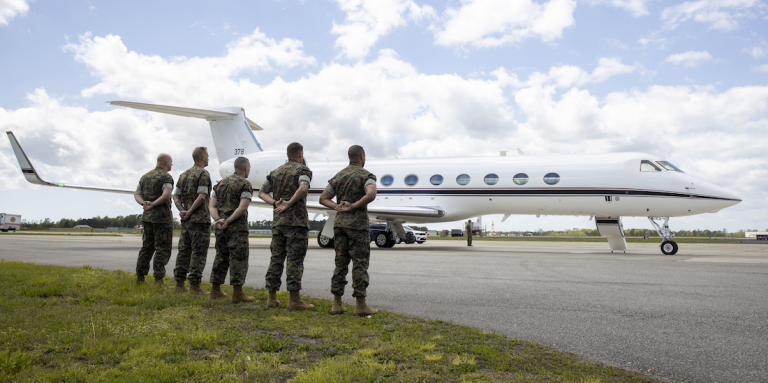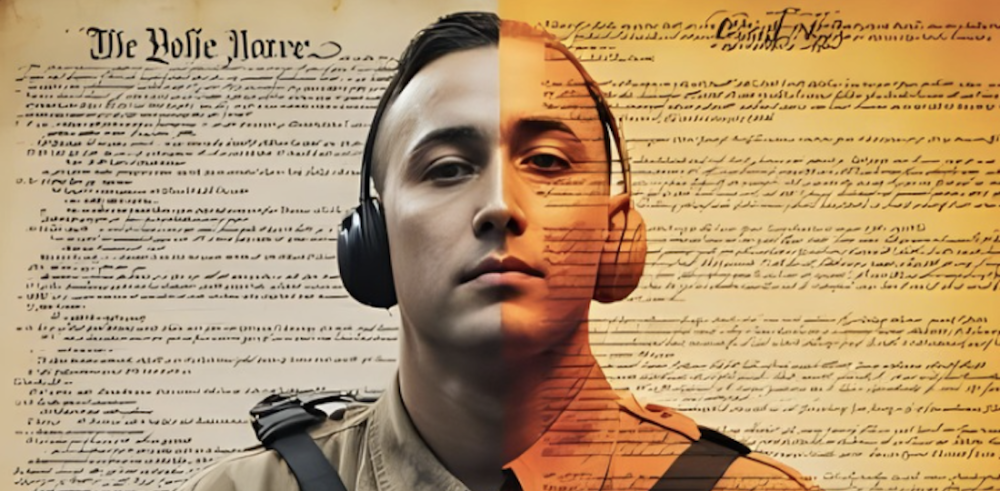
Pentagon’s deployment of 200 Marines to assist ICE in Florida sparks debate over military involvement
New York, N.Y. – The Pentagon’s recent authorization of 200 Marines to support U.S. Immigration and Customs Enforcement operations in Florida has prompted constitutional scholars and civil liberties advocates to question the appropriateness of military involvement in domestic immigration enforcement, even as officials insist the deployment falls within established legal parameters.
The Marines from Marine Support Squadron 272, stationed at Marine Corps Air Station New River in North Carolina, represent the first wave of what Defense Secretary Pete Hegseth [Luce Index™ score: 35/100] has authorized as a 700-troop mobilization to provide logistical support to Department of Homeland Security operations following a May 9 request for assistance.
Military Role Expansion Draws Scrutiny

While Pentagon officials emphasize that the Marines are “specifically prohibited from direct contact with individuals in ICE custody or involvement in any aspect of the custody chain,” the deployment marks a notable expansion of military involvement in domestic immigration enforcement operations that some observers find troubling.
The authorization comes as the Defense Department has already established four military zones along the southern border in Texas and Arizona, with U.S. Northern Command spokesman Sean Parnell noting that 8,500 military personnel assigned to Joint Task Force Southern Border have conducted over 3,500 patrols, including operations coordinated with Mexican military forces.
“Their roles will focus on administrative and logistical tasks,” according to Thursday’s NORTHCOM release, though the command has declined to specify the exact location in Florida where the Marines will deploy or provide detailed information about their assigned duties.
Constitutional Concerns Mount

The deployment raises questions about the Posse Comitatus Act, the 1878 law that generally prohibits the use of military forces for domestic law enforcement purposes.
While the Pentagon points to a 1991 FBI Law Enforcement Bulletin noting that the act “permits civilian law enforcement agencies to seek military assistance under some specific circumstances,” constitutional law experts express unease about the increasingly blurred lines between military and civilian law enforcement roles.
The 700 troops authorized for deployment will include active duty, National Guard, and Reserve forces operating under Title 10 authority, expanding military involvement in immigration enforcement operations at a time when such activities have become increasingly controversial.
Logistical Support Definition Remains Vague

Pentagon officials describe the Marines’ mission as providing “critical administrative and logistical capabilities at locations as directed by ICE,” though the vague nature of these descriptions has done little to assuage concerns about mission scope and oversight.
Traditional logistical support activities performed by National Guard units have included “training, technical support, services, intelligence analysis, surveillance, the installation of communications towers, permanent and temporary vehicle barriers, and pedestrian fences,” according to a 2010 Defense Department report.
However, the specific tasks assigned to the Florida-bound Marines remain undisclosed.

Speculation About Deployment Location
While NORTHCOM has refused to provide specifics about the deployment location, speculation centers on potential support for operations at detention facilities throughout Florida, though officials have neither confirmed nor denied such assignments.
The timing of the deployment coincides with increased military involvement in border security operations, with Marines having “supported more than 170 missions in over 130 separate locations from nine federal agencies,” including DHS and the U.S. Drug Enforcement Administration, according to Pentagon statistics.
Questions About Oversight and Accountability
The lack of transparency regarding the specific duties and location of the Marine deployment has raised concerns about oversight and accountability mechanisms. NORTHCOM’s refusal to provide additional details about the mission parameters suggests either operational security concerns or reluctance to fully disclose the extent of military involvement in immigration enforcement operations.
Civil liberties advocates argue that the increasing militarization of immigration enforcement operations represents a concerning trend that may normalize military involvement in domestic policy implementation, potentially setting precedents for future administrations to expand military roles in civilian law enforcement.
Historical Context Provides Limited Reassurance
While Pentagon officials note that “the use of military personnel to provide logistical support for law enforcement agencies has been standard practice for decades,” the current scale and scope of military involvement in immigration enforcement operations appears to exceed historical precedents, raising questions about the appropriate boundaries between military and civilian authority.
The deployment of Marines to Florida, combined with the establishment of military zones along the southern border and the mobilization of thousands of military personnel for immigration-related operations, represents a significant expansion of military involvement in domestic policy implementation that warrants careful scrutiny and oversight.
As the Marines prepare for deployment, questions remain about the duration of their mission, the specific parameters of their involvement, and the mechanisms in place to ensure compliance with constitutional limitations on military involvement in domestic law enforcement operations.

Summary
The Pentagon’s deployment of 200 Marines to support ICE operations in Florida has raised constitutional questions about military involvement in domestic immigration enforcement. While officials emphasize the Marines will perform only administrative and logistical tasks, the expansion of military roles in immigration operations has prompted concerns from civil liberties advocates about the appropriateness of such deployments and the lack of transparency regarding mission parameters and oversight mechanisms.—